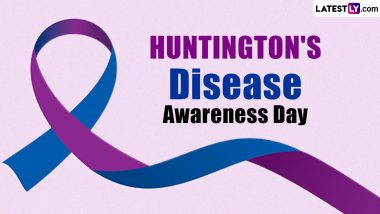Every year on May 15, the Huntington Disease Awareness Day is observed. It is a hereditary condition with no known treatment needing as much research as possible. The disease is known to cause the brain's nerve cells to degenerate, gradually worsening a person's physical, mental, and emotional capabilities. Buildings, monuments and sculptures are frequently illuminated in blue and purple during the month of May, the former to promote awareness of Huntington's disease and the latter to honour juvenile Huntington's.
What is Huntington's Disease?
Huntington's disease is a rare genetic condition that results in the progressive destruction of brain nerve cells. The functional capacities of a person are significantly impacted by Huntington's disease, which typically causes mobility, cognitive, and psychological issues. Study Reveals How Huntington's Disease Affects Different Neurons.
Although signs of Huntington's disease can start to manifest at any age, they frequently do so in adults in their 30s or 40s. Juvenile Huntington's disease is the term used when the disorder first manifests before age 20. Early-stage Huntington's disease has slightly distinct symptoms and may advance more quickly. Huntington's disease symptoms can be managed with the aid of medications. Treatments, however, are unable to stop the condition's effects on the body, mind, and behaviour.
What are the Signs and Symptoms of Huntington's Disease?
Your doctor can assist you in understanding the symptoms of HD or may refer you to specialised HD clinics. Huntington's disease can develop at any age, but it commonly strikes people between the ages of 30 and 50. Your movement, behaviour, thinking, comprehending, learning, and memory are all impacted by HD, in addition to your personality. The most typical symptom is chorea, which is uncontrollable movement. Chorea induces twirling motions. Other mobility issues can cause difficulty speaking and walking.
You can also encounter the following signs:
• Issues with memory, focus, difficulty completing tasks, and impulse control
• Changes in sleep patterns; depression and loss of interest
• Sexual issues
• Swallowing issues
• Falling
There is currently no medication that can stop or reverse the condition. Although HD is presently incurable, some drugs can lessen some symptoms. These drugs might help with behaviour, depression, and mobility. Inquire with your neurologist about your treatment options.
(The above story first appeared on LatestLY on May 15, 2023 07:47 AM IST. For more news and updates on politics, world, sports, entertainment and lifestyle, log on to our website latestly.com).













 Quickly
Quickly




















